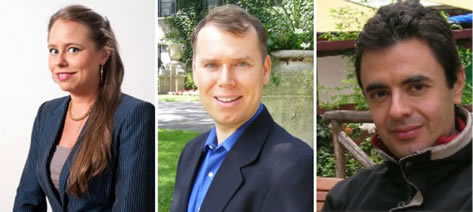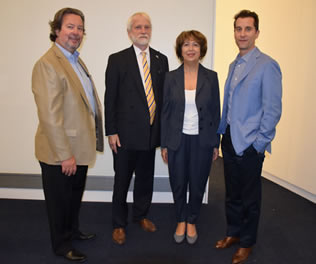
From left to right: Patricia Mindus from Uppsala University, Willem Maas from Glendon, Ettore Recchi from Sciences Po, Paris
On the occasion of the Italian presidency of the European Union, the Istituto Italiano di Cultura, in collaboration with Glendon College, presented a round table on questions of topical interest in September of this year, bringing together three recognized experts in the field of citizenship.
These three experts ‘ Glendon’s Willem Maas, Patricia Mindus from Uppsala University and Ettore Recchi from Sciences Po, Paris ‘ dissected the realities and issues raised by multilevel citizenship in federal entities such as Canada and the European Union.
Professor Maas opened the discussion by stressing how politically important mobility is because of various issues related to status, rights and the community. When we examine the multilevel and internal governance of this mobility, we note a dichotomy between citizens with rights and foreigners without rights, even though this distinction may be simplistic and not always accurate. In theory, states such as Canada, the United States and the EU guarantee citizens’ internal mobility, he pointed out, but this does not always happen in practice. With regard to mobility, Professor Maas cited the case of India, Spain and Germany, and then focused on internal mobility in Canada. Following the adoption of the Canadian Charter of Rights and Freedoms (1982) and the Social Union Framework Agreement (1999), all governments now consider that the freedom of Canadians to pursue their activities anywhere in Canada is an essential element of Canadian citizenship. He concluded with a reminder that the relationship between federalism and citizenship is complex and fascinating, and needs to be studied further.
Swedish Professor Mindus, similarly raised issues related to multilevel citizenship. In her view, the concept of citizenship opens the way to both inclusion and exclusion, and, she stated, the debate around this question is only growing. When we talk about citizenship, we must also talk about those people who are excluded from it, about those who are stateless or foreigners. In addition, citizenship raises questions about social cohesion, democratic legitimacy and the rule of law. When we consider issues related to stateless individuals, multiple citizenship, the black market for identity documents and human trafficking, we can rightly wonder whether nowadays a valid passport has not become the most noble part of a human being’
Finally, Professor Recchi explained that, since freedom of movement within EU member countries is a well-established right, Europe has become, in his own words, “mobile.” According to his research, 3% of EU Europeans have built their lives on this mobility: they are the intra-European migrants. Moreover, 15% of European citizens take ample advantage of this freedom of movement and have spent more than three months living in another European country. Finally, more than half of European citizens have used this mobility to visit another country in Europe over recent years (54%), or are familiar with another EU country (56%). In Recchi’s opinion, Europeans are federalizing their social practices to a greater extent than the EU is doing in the political arena.

- From left to right: Giorgio Visintin, President of the Italian Chamber of Commerce in Ontario, Lars Henriksson, Honourary Consul of Sweden, Adrianna Frisenna, Acting Director of the Italian Cultural Institute of the Italian Consulate, Donald Ipperciel, Principal of Glendon College
This round table was made possible by the collaboration of the Italian Cultural Institute of the Italian Consulate, represented by its acting director Adrianna Frisenna, with Glendon professor Willem Maas.
By Michel Héroux


